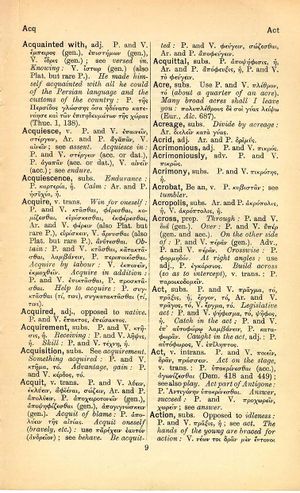acre: Difference between revisions
From LSJ
ἔργον δ' οὐδὲν ὄνειδος, ἀεργίη δέ τ' ὄνειδος → work is no disgrace, but idleness is disgrace | work is no disgrace, but idleness is | work is no disgrace; it is idleness which is a disgrace | work is no disgrace; the disgrace is idleness | work is no disgrace, not working is a disgrace | work is no shame, it is idleness that is shame | there is no shame in work, shame is in idleness
(1) |
m (Text replacement - "(|thumb)\n(\|link=)" to "$1$2") |
||
| Line 1: | Line 1: | ||
{{Woodhouse1 | {{Woodhouse1 | ||
|Text=[[File:woodhouse_9.jpg|thumb | |Text=[[File:woodhouse_9.jpg|thumb|link={{filepath:woodhouse_9.jpg}}]]'''subs.''' | ||
|link={{filepath:woodhouse_9.jpg}}]]'''subs.''' | |||
Use P. and V. [[πλέθρον]], τό (<b class="b2">about a quarter of an acre</b>). | Use P. and V. [[πλέθρον]], τό (<b class="b2">about a quarter of an acre</b>). | ||
Revision as of 17:05, 18 May 2020
English > Greek (Woodhouse)
subs.
Use P. and V. πλέθρον, τό (about a quarter of an acre).
Many broad acres shall I leave you: πολυπλέθρους δὲ σοὶ γύας λείψω (Eur., Alc. 687).
Latin > English (Lewis & Short)
ācre: adv., v. 2. acer.
Latin > French (Gaffiot 2016)
ācrĕ, n., pris advt, v. acer 2.

